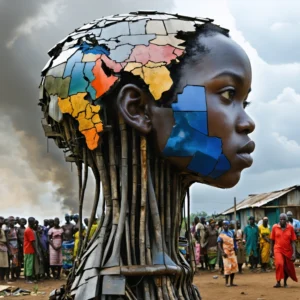
Introduction
The role of international aid agencies in global development has long been a subject of debate and scrutiny. Among these agencies, USAID has been both lauded for its developmental contributions and criticized for its political undertones. In recent times, allegations have emerged suggesting that USAID acted as “a wolf in sheep’s clothing,” with critics arguing that the agency pursued a covert agenda of meddling in African political and economic affairs. This article explores these allegations, examining the historical context, the nature of the claims, and their broader implications for international development and diplomacy in Africa.
Historical Role and Mandate of USAID in Africa
Foundations and Objectives
Established in the early years of the post-World War II era, USAID’s mandate was to promote economic development, humanitarian relief, and democratic governance across the globe. In Africa, this translated into efforts aimed at reducing poverty, improving healthcare and education, and stabilizing economic conditions. The foundational objectives were clear:
- Enhancing socio-economic development through targeted aid programs.
- Supporting infrastructure projects to improve daily living conditions.
- Fostering democratic institutions and governance structures.
- Encouraging trade and economic reforms to integrate nations into the global market.
However, critics argue that beneath these objectives lay a strategy that often aligned with broader geopolitical interests. The drive to secure influence in Africa, particularly during periods of intense Cold War rivalry and post-Cold War strategic restructuring, has fueled suspicions of concealed political intervention.
Evolution Over Time
Over the decades, the operational strategies of USAID in Africa evolved substantially. Initially, the focus was on reconstruction and stabilization, but as regional dynamics shifted, so did the nature of interventions. Patterns of engagement began to blur the lines between humanitarian aid and political maneuvering. The following key shifts illustrate this evolution:
- Expansion of Programmatic Scope: Transition from purely developmental projects to initiatives with embedded political and economic stipulations.
- Strategic Partnerships: Closer collaboration with local governments, which in some cases led to perceptions of bias towards ruling elites aligned with American interests.
- Diversification of Funding: Introduction of programs funded by both governmental and private sources, complicating lines of accountability and influence.
- Increased Transparency Demands: Growing calls from civil society and international watchdogs for a return to genuine developmental aid, free from ulterior political purposes.
Allegations and Criticism: USAID as a Meddling Agent
Political Implications
The recent allegations, most notably voiced by the former African Union ambassador to the United States, paint a damning picture of USAID’s operational conduct. According to these claims, the aid agency went far beyond its humanitarian remit, engaging in political maneuvers designed to shape African governance to suit U.S. geopolitical interests. Key points highlighted by the critics include:
- The orchestration of policy reforms that aligned more closely with Western ideals rather than local needs.
- Selective partnering with governments that were already aligned with U.S. political agendas, potentially sidelining more democratic alternatives.
- An alleged systematic approach to undermining traditional power structures by championing reforms that would centralize power within pro-Western elites.
- The use of developmental aid as a tool of economic leverage in exchange for political concessions.
Such actions have led to a widespread perception that USAID’s interventions were not always rooted in altruism but could, at times, be seen as vehicles for advancing a “major meddling agenda.” The ramifications of these practices may include lasting impacts on national sovereignty and the integrity of democratic processes across several African nations.
Economic and Social Consequences
Beyond the political sphere, the alleged activities of USAID have significant economic and social implications. Critics claim that the misallocation of aid has, in some instances, exacerbated economic disparities and contributed to systemic corruption. Specific concerns include:
- Economic Dependency: The creation of long-term dependencies on foreign aid, undermining the development of self-sufficient local economies.
- Market Distortion: Intervention strategies that inadvertently distort local markets, leading to unintended consequences in sectors such as agriculture and manufacturing.
- Social Fragmentation: Policies that may favor certain social groups over others, thereby deepening existing societal divides.
In order to address these issues, it is essential to reassess the operational frameworks of aid agencies to ensure that developmental programs do not come at the expense of local agency and political autonomy.
Analytical Perspectives and Recommendations for Future Engagement
Multiple Viewpoints on International Development
A comprehensive analysis of USAID’s role in Africa must consider multiple perspectives, including those of donor agencies, recipient governments, and civil society organizations. To facilitate a balanced discussion, the following table outlines contrasting viewpoints regarding the agency’s impact:
| Aspect | Supporters’ Perspective | Critics’ Perspective |
|---|---|---|
| Developmental Impact | Improved infrastructure, better healthcare, and increased access to education. | Overemphasis on material projects with little regard for local needs and sustainability. |
| Political Influence | Promotion of democratic principles and good governance. | Undermining local political autonomy and favoring regimes that secure Western interests. |
| Economic Outcomes | Stimulated local economies by fostering trade and industry development. | Creation of economic dependency, leading to systemic issues and market distortions. |
| Social Benefits | Strengthened community resilience and social welfare programs. | Initiatives that sometimes lead to social fragmentation and neglect of grassroots empowerment. |
This table captures the essence of the debate, underscoring the need for increased transparency and accountability in development aid operations.
Recommendations for Future International Aid
Moving forward, several strategic recommendations may help re-align international aid initiatives towards fostering genuine development while respecting the political and cultural integrity of the recipient nations:
- Enhanced Oversight and Accountability: Establish independent monitoring bodies to ensure that aid programs are implemented in alignment with transparent, democratically backed objectives.
- Local Partnerships and Community Involvement: Strengthen the role of local civil society organizations in planning and executing developmental projects.
- Focus on Sustainable Outcomes: Prioritize initiatives that build long-term local capacity, reducing reliance on external aid and fostering economic independence.
- Clear Separation Between Aid and Politics: Develop stricter guidelines to prevent the use of developmental aid as a tool for political intervention.
- Collaborative Policy Formulation: Engage multiple stakeholders, including recipient governments and independent experts, to create well-rounded aid strategies.
By adopting these measures, the international community can foster a more equitable framework for aid delivery—one that emphasizes mutual respect, collaboration, and genuine developmental progress.
In conclusion, the allegations surrounding USAID’s role in Africa invite a broader conversation about the inherent complexities of international aid. While the agency has undeniably contributed to developmental gains across the continent, the critiques concerning its political maneuvering present a cautionary tale. A balance must be struck between achieving economic and social progress on one hand, and maintaining the political sovereignty and cultural authenticity of the nations on the other. Moving beyond a simplistic narrative, it is crucial for policymakers, international agencies, and local stakeholders to work together in creating a framework for aid that is both transparent and respectful of the diverse aspirations of African societies.




